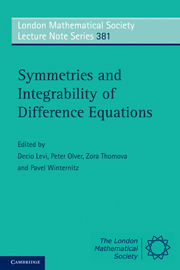Book contents
- Frontmatter
- Contents
- List of figures
- List of contributors
- Preface
- Introduction
- 1 Lagrangian and Hamiltonian Formalism for Discrete Equations: Symmetries and First Integrals
- 2 Painlevé Equations: Continuous, Discrete and Ultradiscrete
- 3 Definitions and Predictions of Integrability for Difference Equations
- 4 Orthogonal Polynomials, their Recursions, and Functional Equations
- 5 Discrete Painlevé Equations and Orthogonal Polynomials
- 6 Generalized Lie Symmetries for Difference Equations
- 7 Four Lectures on Discrete Systems
- 8 Lectures on Moving Frames
- 9 Lattices of Compact Semisimple Lie Groups
- 10 Lectures on Discrete Differential Geometry
- 11 Symmetry Preserving Discretization of Differential Equations and Lie Point Symmetries of Differential-Difference Equations
- References
6 - Generalized Lie Symmetries for Difference Equations
Published online by Cambridge University Press: 05 July 2011
- Frontmatter
- Contents
- List of figures
- List of contributors
- Preface
- Introduction
- 1 Lagrangian and Hamiltonian Formalism for Discrete Equations: Symmetries and First Integrals
- 2 Painlevé Equations: Continuous, Discrete and Ultradiscrete
- 3 Definitions and Predictions of Integrability for Difference Equations
- 4 Orthogonal Polynomials, their Recursions, and Functional Equations
- 5 Discrete Painlevé Equations and Orthogonal Polynomials
- 6 Generalized Lie Symmetries for Difference Equations
- 7 Four Lectures on Discrete Systems
- 8 Lectures on Moving Frames
- 9 Lattices of Compact Semisimple Lie Groups
- 10 Lectures on Discrete Differential Geometry
- 11 Symmetry Preserving Discretization of Differential Equations and Lie Point Symmetries of Differential-Difference Equations
- References
Summary
Introduction
In this chapter we discuss the application of generalized symmetries to the investigation of difference and differential-difference equations. This is a sequel to the presentation of P. Winternitz where Lie point symmetries for difference equations have been introduced and studied in detail. In particular it has been shown there that for a given discrete equation, unless we allow for variable lattices, i.e., we consider a difference scheme, very few symmetries are present. So, if we want to get symmetries for difference equations, either we consider the point symmetries of a difference scheme or we extend the class of symmetries to the case of the generalized symmetries. In the following we will proceed in this second direction and analyze the structure of the generalized symmetries for a difference equation. We will limit ourselves to consider just partial difference equations (with two independent variables) where the lattice is fixed and non-transformable and either all independent variables are discrete (n,m) or one is discrete n and one is continuous t. We will limit our discussion to the case of scalar equations of a low order, i.e., when the dependent variable is a scalar and the differential difference equations involve at most derivatives of the second order of the fields and nearest neighboring interactions.
- Type
- Chapter
- Information
- Symmetries and Integrability of Difference Equations , pp. 160 - 190Publisher: Cambridge University PressPrint publication year: 2011
References
- 2
- Cited by



